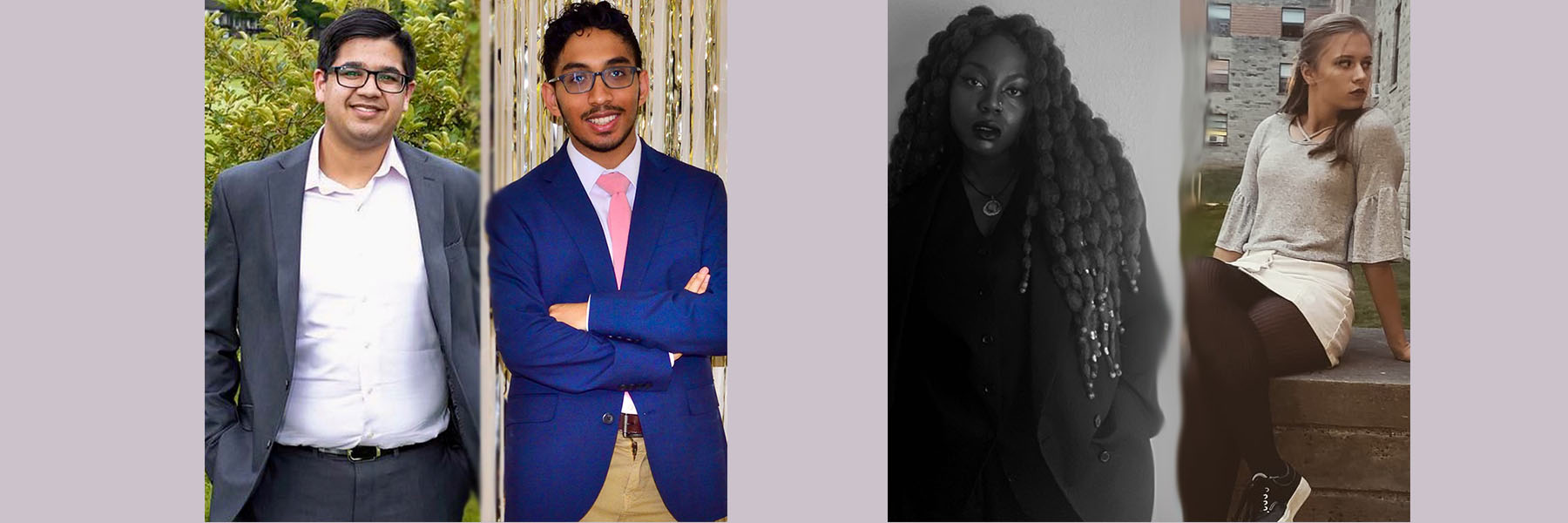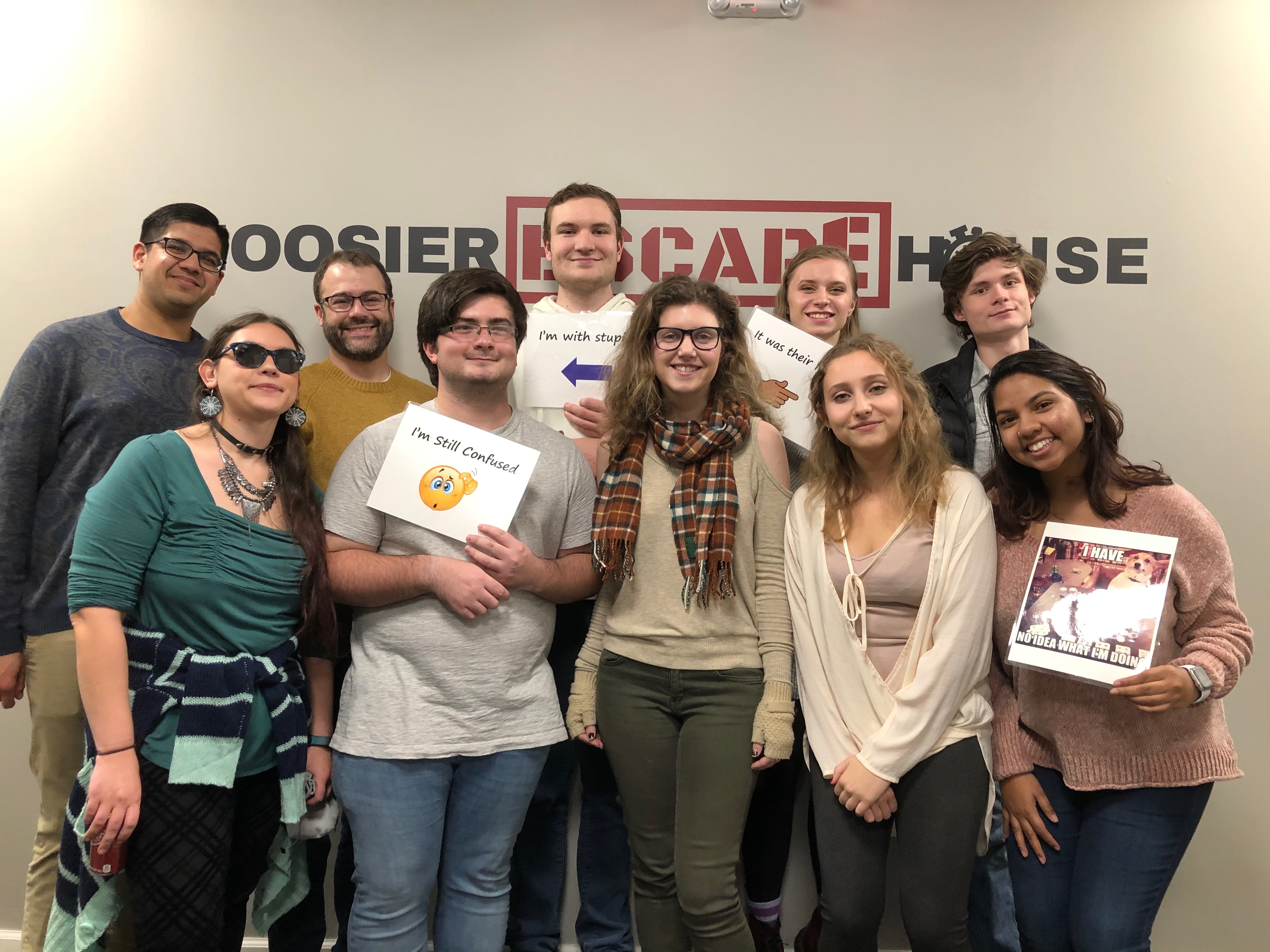From 2019 to 2021, debating online and Covid
At the end of Spring 2020 semester, much was in doubt about the future of intercollegiate debate during a pandemic. During the first weekend of march, thirteen students representing the Indiana University debate team were attending the American Debate Association (ADA) national championship in Las Vegas when news started coming in that Universities were likely shutting down travel and potentially going virtual. Despite the headlines, IU debate finished the Vegas tournament strong with a quarterfinal appearance by our junior varsity and novice teams. A little drama soon followed as we rushed to the airport to make our flight. Sophomore Janet Oluwayomi and Freshmen Chris Guo mistakenly (capered) the crate containing the junior varsity travelling championship trophy instead of their quarterfinal trophies, a classic Vegas stunt. We became aware of the issue while watching the trophy case load into our Bloomington bound plane as the tournament director was left dumbfounded while calling the team via phone. The trophy was eventually returned through snail mail once it made a short stop in Bloomington.Indiana University qualified our Senior-Junior duo of Victoria Lincourt and Drew Bagan to the 74th National Debate Tournament that was scheduled to be held at the end of March on the James Madison University campus. Their endeavors marked IU’s 5th year qualifying in a row and its 7th year qualifying overall as a program. The qualification was especially notable since both Drew and Victoria started as novice debaters on the program with limited high school experience. They were true Home Grown Hoosiers. Unfortunately, with only two weeks to adapt to covid closures, the 2020 NDT was cancelled.
Despite covid lockdowns, the debate community proved its enterprising capacities by rapidly developing a method to move debate tournaments online. The University of Kentucky hosted the first national championship high school tournament virtually with nearly a thousand participants by mid-April. The endeavor included a multitude of college coaches and students establishing a proof of concept for the 2020-2021 season.
After graduating one student, the debate team continued to meet weekly throughout the summer leading up to the fall semester. Our team as family proved robust as we leaned on each other for support through the doldrums of lockdown. IU debate invested in high quality microphones, external monitors, headsets, and high-definition web cameras as we began to learn how to debate to audiences through a screen. After a year of digital debate, the accepted conclusion is that it can be a helpful supplement for debate communities, but brick-and-mortar in-person debate cannot be fully replaced. The acoustics, live adaptions, and experience of in-person debate are too complex for digital programs to completely model and those remainders that are uncaptured are far too important to human communication and human being.
Eleven students competed for IU debate during the Fall and Spring of 2020-2021 which was a win on its own. The most significant victory for the program included IU qualifying two of our varsity teams to the National Debate Tournament. Senior Mehul Gupta and Freshman partner Aryan Jasani qualified first followed by Junior duo, Janet Oluwayomi and Payton Holland.
Most programs across the country witnessed attrition as they struggled to recruit new and retain old students. Students who were reeling from the stress of the lockdown and online/hybrid education models, understandably avoided stressful activities like debate. A few freshmen students joined us without ever stepping foot in Bloomington, including two debaters with some high school experience from Texas. The topic for the year focused on the question of where the US should draw the line with its military alliance commitments. With hybrid warfare (non-uniformed military invasions, cyber attacks, etc.) creating significant grey areas around the world, the topic proved fruitful.
With crisis comes innovation. Despite barriers to recruitment, IU hosted four significant callout events and onboarding programs throughout the entire academic year. In the past, in-person recruitment often halted in early September after the 100 or so students who arrive at our callouts eventually whittle down to a core team. Since online team meetings held on Zoom replaced in-person, the coaching staff, alumni, and debaters pitched in to create an online learning platform with introductory videos where new students could “catch up” on their own time. Furthermore, we hosted Winter, early spring, and end of semester onboarding sessions that resulted in over 20 students learning about debate and engaging in varying levels of practice debate activities. The hope is that once we return to campus in Fall of 2021, the conversion rate for these students will be high and we will return to the full program capacity that we witnessed in early 2020.
Beyond competitive debate, the team continued to engage in public debate activities. After brick-and-mortar schools closed, we challenged Kansas State to a debate about what level of intrusiveness should we accept in response to dangerous global pandemics. IU defended a Korean model of tracking and monitoring while K-State opposed. The debate was judged by IU O’Neill SPEA health care faculty experts and a public audience. In all over 50 people watched the live cast debate. IU won the expert panel while K-State won the audience vote. IU took part in three live Presidential and Vice-presidential debate watches. The most significant event included a co-lead event with the University of Minnesota, Gonzaga, University of Georgia, Mary Washington, and Missouri State. Students were provided with a pre-debate analysis in how to judge arguments on their merits and the history of presidential debates. These students were then divided into working groups with debate coach leads to generate conversations across the nation on the upcoming election. Over 100 students took part in the endeavor which may prove to be a replicable model for future public debate watches!
The 2021-2022 topic has been selected. We will debate about expanding the scope of antitrust laws in the United States. Alumni and Federal Trade Commission Lawyer Dana Abrahamsen has already provided the team with expert analysis of the topics and may join us for a team Q&A session once the semester starts! The season travel schedule is still undecided with late October and mid-November tournaments likely in-person.
IU debate did host an online version of our debate camp during the summer of 2020. Forty high school students attended. The 10th annual camp would have been hosted in 2021, but the executive decision was made to cancel due to increased uncertainty on whether the program could be held online or in-person. With more in-person activities becoming common as vaccination rates increased, we assumed an online debate camp would be a difficult sell to parents who would want their children off the computer for the first time in a year. The camp will likely return in 2022.
Indiana University debate continues to grow and adapt to our circumstances. We believe our activity has proven to be resilient and innovative as you likely remember from your time on the team. In leau of a debate camp, IU Debate engaged in a high school policy debate podcast/vidcast series titled “Winning the H20 Debates!” IU experts on the water protections topic for high school debate were invited to opine about the 2021-2022 topic.



